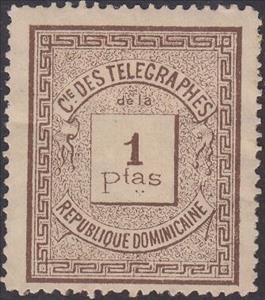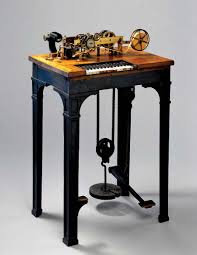Stamp: Numeral (Dominican Republic 1887)
Numeral (Dominican Republic 1887)
01 January (Dominican Republic ) within release Compagnie des Telegraphes de la Republique Dominicaine goes into circulation Stamp Numeral face value 1 Dominican peso
| Stamp Numeral in catalogues | |
|---|---|
| Yvert et Tellier: | Yt: DO TE3 |
Stamp is square format.
Issued by a private telegraph company, but listed with Dominican Republic national issues by Yvert and Barefoot.Also in the issue Compagnie des Telegraphes de la Republique Dominicaine:
- Stamp - Numeral face value 25;
- Stamp - Numeral face value 50;
- Stamp - Numeral face value 1;
- Stamp - Numeral face value 5;
- Stamp - Numeral face value 10;
|
Data entry completed
53%
|
|
|---|---|
| Stamp Numeral in digits | |
| Country: | Dominican Republic |
| Date: | 1887-01-01 |
| Perforation: | 13½ |
| Emission: | Telegraph & Telephone |
| Format: | Stamp |
| Face Value: | 1 Dominican peso |
Stamp Numeral it reflects the thematic directions:
A number is a mathematical object used to count, measure, and label. The most basic examples are the natural numbers 1, 2, 3, 4, and so forth. Numbers can be represented in language with number words. More universally, individual numbers can be represented by symbols, called numerals; for example, "5" is a numeral that represents the number five. As only a relatively small number of symbols can be memorized, basic numerals are commonly organized in a numeral system, which is an organized way to represent any number. The most common numeral system is the Hindu–Arabic numeral system, which allows for the representation of any non-negative integer using a combination of ten fundamental numeric symbols, called digits. In addition to their use in counting and measuring, numerals are often used for labels (as with telephone numbers), for ordering (as with serial numbers), and for codes (as with ISBNs). In common usage, a numeral is not clearly distinguished from the number that it represents.
Telegraphy is the long-distance transmission of messages where the sender uses symbolic codes, known to the recipient, rather than a physical exchange of an object bearing the message. Thus flag semaphore is a method of telegraphy, whereas pigeon post is not. Ancient signalling systems, although sometimes quite extensive and sophisticated as in China, were generally not capable of transmitting arbitrary text messages. Possible messages were fixed and predetermined, so such systems are thus not true telegraphs.


